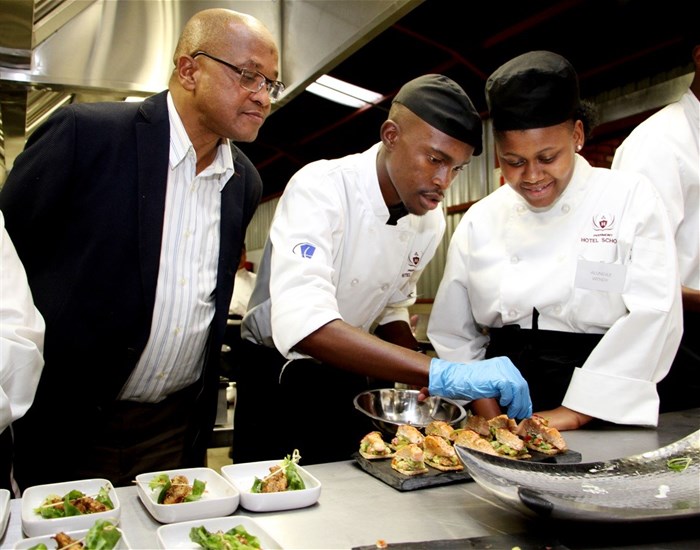Education and unemployment are two of the most concerning challenges facing the youth of South Africa. The Peermont Community Benefit Trust (PCBT), in association with service provider Celo, identified an opportunity to establish the Peermont Hotel School in an effort to make a positive contribution towards tourism development. Supported by the Metropolitan Municipality of Ekurhuleni, the school opened its doors on 3 May 2016.

Tshidi, MMC Mahlangu and Vusi
Grooming future hospitality leaders
The school offers skills-based training that gives young individuals the necessary platform and opportunity to start a career in the hospitality industry. “The hospitality sector remains one of the fastest growing sectors in the economy. With that in mind, the Peermont Hotel School empowers the community through education and development, ultimately grooming our future hospitality leaders”, comments Vusi Zwane, a PCBT Trustee.
Celo, hospitality specialists in events, training and consulting, have been appointed by the PCBT to establish the school and manage the delivery of the training programmes. “The method of delivery and type of training will ensure transfer of skills, the creation of jobs, and in so doing contribute towards poverty alleviation”, comments Jeanne Visagie of Celo.
Located at Emperors Palace, the Peermont Hotel School offers Skills Proficiency certificates to chefs, waiters and housekeepers. All learners are contracted on a 12-month period, and over-and-above the bursary, receive a stipend from the Metropolitan Municipality of Ekurhuleni. The learners will spend two months at the school, two months at Emperors Palace and a further eight months with hospitality industry partners for practical experience. These underprivileged individuals will enjoy access to the marketplace, especially those from child-headed households and vulnerable youth. The duration of the qualification supports the learners in becoming employable and to earn an income to support their families.

MMC Mahlangu, Ntokozo and Wendy
What differentiates the Peermont Hotel School
There are a number of factors that make the Peermont Hotel School different from other hotel schools. The most notable difference is that the school was founded through a need that existed for basic skills in the hospitality industry. The school’s objective is to focus on the fundamentals of the various disciplines and to lay a solid foundation for the learners’ career.
Together with industry professionals, the skills outcomes were first identified and packaged in a custom-designed programme, before considering the existing qualification platforms. The hospitality industry is very demanding and requires sacrifice and discipline to succeed. With work ethic and values in mind, the programmes were structured in such a way that they represent conditions faced in the workplace.
Lastly, most hotel schools are run as profit centres and are, therefore, subject to tuition fees. The tuition fees are in many cases the main reason why potential learners are unable to pursue their dreams of a career in hospitality. At the Peermont Hotel School, the selected learners study on a full bursary.
“Over and above the skills and procedures required in the hospitality industry, the training is based on a value system that will provide learners with much-needed life skills for the future. Entrepreneurial ethics are also included to ensure that learners have the correct foundation to take their future into their own hands”, concludes Zwane.





















































